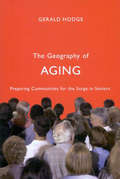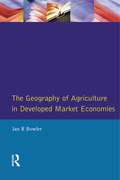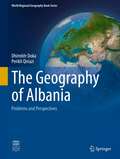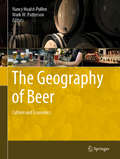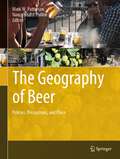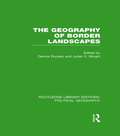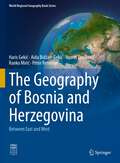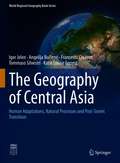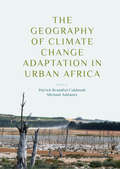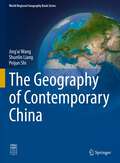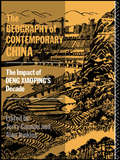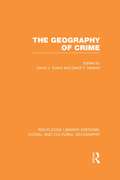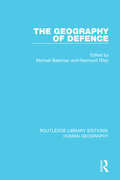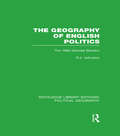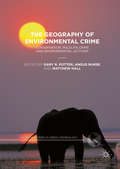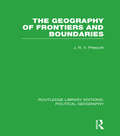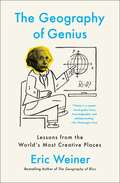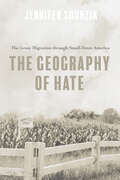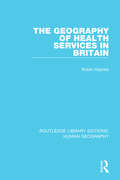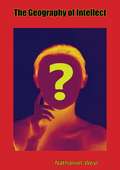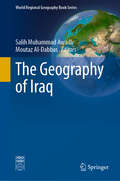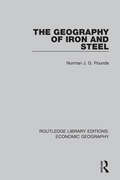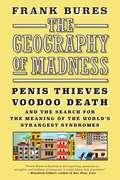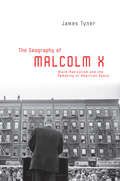- Table View
- List View
The Geography of Aging
by Gerald HodgeGerald Hodge uses the latest statistics to map the current and future spatial distribution of Canada's seniors and their diversity. Drawing on tested aging-environmental research and years of planning experience, he delineates the everyday geography of seniors and proposes a comprehensive framework for all communities - large and small, urban, suburban, and rural - that will allow them to respond to the needs of a rapidly aging population while recognizing the importance of maintaining the independence of their seniors.
The Geography of Agriculture in Developed Market Economies
by I.R. BowlerFirst published in 1993. The broad objective of this book is to describe and explain the contemporary geography of agriculture in developed market economies. The objective has been approached by a team of agricultural geographers, each writer contributing an analysis of a particular topic.
The Geography of Albania: Problems and Perspectives (World Regional Geography Book Series)
by Dhimitёr Doka Perikli QiriaziThis book is the first to give a comprehensive and detailed overview of the complete geography of Albania in English. It highlights the most important and manifold potentials of nature, society and economy of Albania as well as development problems during different time periods. One focus lies on Albania's perspectives and challenges for the future.Beside natural aspects also topics such as migration, poverty, social situation, economy, urban development, regional disparities among others are discussed.This book appeals to academics and researchers of geography, regional development and related disciplines as well as teachers and students of geography, geology, natural sciences, social sciences, economics. The book is also attractive for media representatives, tourists and other interested individuals travelling to Albania.
The Geography of Beer: Culture and Economics
by Mark W. Patterson Nancy Hoalst-PullenThis book builds on the highly successful Geography of Beer: Regions, Environment, and Society (2014) and investigates the geography of beer from two expanded perspectives: culture and economics. The respective chapters provide case studies that illustrate various aspects of these themes. As the beer industry continues to reinvent itself and its economic and cultural geographies, this book showcases historical, current, and future trends at the local, regional, national, and international scales.
The Geography of Beer: Policies, Perceptions, and Place
by Mark W. Patterson Nancy Hoalst-PullenThis book focuses on the geography of beer in the contexts of policies, perceptions, and place. Chapters examine topics such as government policies (e.g., taxation, legislation, regulations), how beer and beerscapes are presented and perceived (e.g., marketing, neolocalism, roles of women, use of media), and the importance of place (e.g., terroir of ingredients, social and economic impacts of beer, beer clubs). Collectively, the chapters underscore political, cultural, urban, and human-environmental geographies that underlie beer, brewing, and the beer industry.
The Geography of Border Landscapes (Routledge Library Editions: Political Geography)
by Dennis Rumley Julian V. MinghiThis volume is about border landscapes, with emphasis on the varying impact that political decision-making and ideological differences can have on the environment at border locations, for example. This volume by political-geography experts from across the globe provides important insights specficially into border landscapes and so serves to further our understanding of aspects of cultural landscapes.
The Geography of Bosnia and Herzegovina: Between East and West (World Regional Geography Book Series)
by Haris Gekić Aida Bidžan-Gekić Nusret Drešković Ranko Mirić Péter ReményiThis monograph provides a comprehensive overview of fundamental scientific insights into the geographical features of a country which was and still is in the centre of the geopolitical battle of the large world powers and especially neighboring countries. The book presents the scientifically proven reserves of individual resources such as: mineral riches, land, forests, flora and fauna, water and climate features, to the extent needed, through statistical indicators and geographic maps. The authors point to features and specifics of the existing interdependence of economic and political development and impact of natural resources on spatial development which can be useful for potential investors, spatial planers, decision makers, politicians, geographers, students, large Bosnian diaspora and anyone interested in area of Bosnia and Herzegovina. This book fills the gap in geographical literature on Bosnia and Herzegovina in the English language. The monograph appeals to researchers and scholars of all levels in the fields of geography, geopolitics, history and related fields and everyone interested in this country between East and West.
The Geography of Central Asia: Human Adaptations, Natural Processes and Post-Soviet Transition (World Regional Geography Book Series)
by Igor Jelen Angelija Bučienė Francesco Chiavon Tommaso Silvestri Katie Louise ForrestThis book provides a profound geographical description and analysis of Central Asia. The authors take a synthetic approach in a period of critical transformation in the post-soviet time. The monograph analyzes comprehensively the physical and human geography as well as human-nature interactions of Central Asia with focus on Kazakhstan, Uzbekistan, Turkmenistan, Kyrgyzstan and Tajikistan. Natural processes are described at a systemic scale, focusing on ecological impacts and consequences and contemporary human adaptations and organization. It also discusses in which ways the human organizations try to apply solutions for their needs such as security, territorial management and resources renewability, material and functional needs, identity elaborations, culture and communication. The Geography of Central Asia appeals to scientists and students of regional geography and interested academics from other areas such as social, political, economic and environmental studies within the context of Central Asia. The book is also a very useful resource for field trips into this area.
The Geography of Climate Change Adaptation in Urban Africa
by Patrick Brandful Cobbinah Michael AddaneyThis book take a comprehensive look at several cases of climate change adaptation responses across various sectors and geographical areas in urban Africa and places them within a solid theoretical context. Each chapter is a state-of-the-art overview of a significant topic on climate change adaptation in urban Africa and is written by a leading expert in the field. In addition to the focus on the geography of urban adaptation to climate change in Africa, this collection offers a broader perspective by blending the use of case studies and theory based research. It examines transformations in climate change adaptation and its future orientation from the perspectives of urban planners, political economists, environmentalists, ecologists, economists and geographers, thereby addressing the challenges facing African cities adaptation responses from all angles. Providing up-to-date and authoritative contributions covering the key aspects of climate change adaptation in urban Africa, this book will be of great interest to policymakers, practitioners, scholars and students of geography, urban development and management, environmental science and policy, disaster management, as well as those in the field of urban planning.
The Geography of Climate Change Adaptation in Urban Africa
by Patrick Brandful Cobbinah Michael AddaneyThis book takes a comprehensive look at several cases of climate change adaptation responses across various sectors and geographical areas in urban Africa and places them within a solid theoretical context. Each chapter is a state-of-the-art overview of a significant topic on climate change adaptation in urban Africa and is written by a leading expert in the field. In addition to the focus on the geography of urban adaptation to climate change in Africa, this collection offers a broader perspective by blending the use of case studies and theory based research. It examines transformations in climate change adaptation and its future orientation from the perspectives of urban planners, political economists, environmentalists, ecologists, economists and geographers, thereby addressing the challenges facing African cities adaptation responses from all angles. Providing up-to-date and authoritative contributions covering the key aspects of climate change adaptation in urban Africa, this book will be of great interest to policymakers, practitioners, scholars and students of geography, urban development and management, environmental science and policy, disaster management, as well as those in the field of urban planning.
The Geography of Contemporary China (World Regional Geography Book Series)
by Peijun Shi Shunlin Liang Jing’ai WangThis textbook provides a comprehensive and very detailed insight into Chinese Contemporary Geography in English. It documents the geographical issues associated with China's rapid growth. Since initiating the reforms and open policy, China has achieved tremendous success. China's rapid growth is now a driving force in the global economy and is achieving unprecedented rates of poverty reduction. However, China also faces a number of sustainability and emerging challenges associated with rapid growth such as growing regional disparities in terms of per capita income and social-economic development, sustainable resource development, and issues related to regional and global economic integration. In addition, rapid economic growth has also brought about major challenges such as resource shortages, ecological and environmental destruction, land degradation and frequent disasters. This book presents the authors’ reflections. This lavishly illustrated book covers physical geography, history, and economic and political systems of the world's most populous country. The major focus is on geographical issues in China's contemporary development: agriculture, population, urbanization, resource and energy, and environment. The lead author of the book has taught relevant courses in China for three decades, and authored and edited multiple textbooks for Chinese students. This book will appeal to undergraduate students of geography and related disciplines with a regional focus on China and to the general reader who wants to learn different geographical aspects of modern China with little academic background in geography.
The Geography of Contemporary China: The Impact of Deng Xiaoping's Decade
by Terry Cannon Alan JenkinsDeng Xiaoping's rule has seen fundamental economic change in China. This book considers the impact of these years on China's physical environment, as well as its people, industry, agriculture and trade. It also assesses the contribution of a decade of Chinese politics towards geopolitics. The book provides an introduction to Communist China, setting its spatial and environmental themes in the historical, political and economic framework so crucial to a proper understanding of this country and the fifth of the world's population it contains. It is particularly suited to courses on China, its geography and development strategy. After the bloody events of Tiananmen Square in June 1989 China's geopolitics will continue to hold the world's attention. With this in view the book also provides guides to further reading.
The Geography of Crime (Routledge Library Editions: Social and Cultural Geography)
by David T. Herbert David J. EvansThis book presents original research into contemporary geographical aspects of the study of crime. The contributors, drawn from different disciplines within the social sciences and from various countries, give a review of the subject which provides a valuable insight into the geography of crime. Their approaches range from the behavioural to the environmental, and the crimes dealt with include violent crime and residential burglary. The book examines data sources, discusses different crimes and ways of studying them and considers the fear of crime. The criminal justice system in the UK is examined in detail, including policy, the operations of community and police committees and an account of the experience of crime prevention policies in Britain and North America is also given.
The Geography of Defence (Routledge Library Editions: Human Geography #1)
by Michael Bateman Raymond RileyDefence against military attack has had a considerable geographical impact. Urban morphology frequently owes more to the defence function than to any other, whilst local, regional and national economies are often intricately dependent on defence expenditure. It is also clear that the social geography of cities, both recently and in the past, has been affected by the presence of the military. Despite its importance, defence as a major government function has not been the focus of geographical analysis in the same way as housing , transport, health or education. This volume redresses this imbalance by demonstrating the geographical importance of defence in these vital areas.
The Geography of English Politics: The 1983 General Election (Routledge Library Editions: Political Geography)
by R. J. JohnstonThis book illustrates the degree of variability in voting behaviour within social groups and suggests reasons for that variability. It reviews and critiques conventional analyses and presents statistical analyses of the geography of voting in England. The book reveals that substantial geographical variations exist in the widely-held generalisations, such as that white-collar owner-occupiers favour the Conservatives or that blue-collar council tenants prefer Labour.
The Geography of Environmental Crime
by Matthew Hall Gary R. R. Potter Angus NurseThis book critically examines both theory and practice around conservation crimes. It engages with the full complexity of environmental crimes and different responses to them, including: poaching, conservation as a response to wildlife crime, forest degradation, environmental activism, and the application of scientific and situational crime prevention techniques as preventative tools to deal with green crime. Through the contributions of experts from both the social and ecological sciences, the book deals with theoretical and practical considerations that impact on the effectiveness of contemporary environmental criminal justice. It discusses the social construction of green crimes and the varied ways in which poaching and other conservation crimes are perceived, operate and are ideologically driven, as well as practical issues in environmental criminal justice. With contributions based in varied ideological perspectives and drawn from a range of academic disciplines, this volume provides a platform for scholars to debate new ideas about environmental law enforcement, policy, and crime prevention, detection and punishment.
The Geography of Frontiers and Boundaries (Routledge Library Editions: Political Geography)
by J. R. PrescottThis book, originally published in 1986, shows the importance of geography in international power politics and shows how geopolitical thought influences policy-making and action. It considers the various elements within international power politics such as ideologies, territorial competition and spheres of influences, and shows how geographical considerations are crucial to each element. <P><P> It considers the effects of distance on global power politics and explores how the geography of international communication and contact and the geography of economic and social patterns change over time and affect international power balances.
The Geography of Genius: A Search for the World's Most Creative Places from Ancient Athens to Silicon Valley
by Eric Weiner"An intellectual odyssey, a traveler's diary, and a comic novel all rolled into one. Smart, original, and utterly delightful." --Daniel Gilbert, Harvard professor and bestselling author of Stumbling on Happiness "A charming mix of history and wisdom cloaked as a rollicking travelogue." --Walter Isaacson, bestselling author of Steve Jobs Travel the world with Eric Weiner, the New York Times bestselling author of The Geography of Bliss, as he journeys from Athens to Silicon Valley--and throughout history, too--to show how creative genius flourishes in specific places at specific times.In The Geography of Genius, acclaimed travel writer Weiner sets out to examine the connection between our surroundings and our most innovative ideas. He explores the history of places, like Vienna of 1900, Renaissance Florence, ancient Athens, Song Dynasty Hangzhou, and Silicon Valley, to show how certain urban settings are conducive to ingenuity. And, with his trademark insightful humor, he walks the same paths as the geniuses who flourished in these settings to see if the spirit of what inspired figures like Socrates, Michelangelo, and Leonardo remains. In these places, Weiner asks, "What was in the air, and can we bottle it?" This link can be traced back through history: Darwin's theory of evolution gelled while he was riding in a carriage. Freud did his best thinking at this favorite coffee house. Beethoven, like many geniuses, preferred long walks in the woods. Sharp and provocative, The Geography of Genius redefines the argument about how genius came to be. His reevaluation of the importance of culture in nurturing creativity is an informed romp through history that will surely jumpstart a national conversation.
The Geography of Hate: The Great Migration through Small-Town America
by Jennifer SdunzikThe uncomfortable truths that shaped small communities in the midwest During the Great Migration, Black Americans sought new lives in midwestern small towns only to confront the pervasive efforts of white residents determined to maintain their area’s preferred cultural and racial identity. Jennifer Sdunzik explores this widespread phenomenon by examining how it played out in one midwestern community. Sdunzik merges state and communal histories, interviews and analyses of population data, and spatial and ethnographic materials to create a rich public history that reclaims Black contributions and history. She also explores the conscious and unconscious white actions that all but erased Black Americans--and the terror and exclusion used against them--from the history of many midwestern communities. An innovative challenge to myth and perceived wisdom, The Geography of Hate reveals the socioeconomic, political, and cultural forces that prevailed in midwestern towns and helps explain the systemic racism and endemic nativism that remain entrenched in American life.
The Geography of Health Services in Britain. (Routledge Library Editions: Human Geography #9)
by Robin HaynesThis book is about geographical variation in the organisation, provision and use of health services in Britain. Its main theme is that neither the quantity nor the quality of health care provided by the National Health Service (NHS) is uniform from place to place. Chapters discuss and evaluate: The reorganisation of the NHS in the years up to 1987 The relationships between the need for health care and the supply of health services The redistribution of health service resources geographically The distribution of doctors, dentists, community nurses and hospitals across the UK Access to health services The distribution of both private health facilities and social welfare services and their effect on the NHS.
The Geography of Intellect
by Nathaniel Weyl Prof. Stefan T. PossonyUntil the first publication of the Geography of Intellect in 1963, the study of human intelligence, its distribution and causes, had been confined to inaccessible scholars’ journals. With the publication of works by Carleton S. Coon, Ernst Mayr and others—dealing with the evolution of man and his various sub-groups—has grown a strong popular interest in the findings of anthropological science:What has made man? Why do his civilizations rise and fall? How can we make certain that our current rate of material progress is maintained or increased, that we do not fall into the graveyard of civilizations wherein are buried Periclean Greece, Imperial Rome, Post-Inquisition Spain, Islamic civilization and the monstrous Nazi regime?“No one can read Nathaniel Weyl without realizing the has is clearly a man of intellectual honesty, attempting to perform a signal service for us all.”—NATIONAL REVIEW“So lucid and admirable a style”—NEW REPUBLIC“Professor Possony is an admirable historian, and his book is a careful and well-documented account.”—THE ANNALS“Dr. Possony—deeply steeped in general sociology—stands out among the younger historians whose work has commanded attention in Europe and in this country.”—THE NEW LEADER
The Geography of Iraq (World Regional Geography Book Series)
by Salih Muhammad Awadh Moutaz Al-DabbasHuman civilization first emerged in ancient Mesopotamia, where the first writing and the first technologies originated. Writing about Mesopotamia the Cradle of Civilization (the land between the rivers, the Tigris and Euphrates Rivers, modern-day Iraq) is interesting for all interesting readers in the world. Iraq is one of the most beautiful, diverse, and impressive countries in the world. Iraq has a diverse range of environments, landscapes, inhabitants, activities, and cultural heritage, and human civilization has a lot to offer. An extensive collection of original materials gathered over the past few decades was used to elaborate on the geography of Iraq in a novel-length book. The geography of Iraq includes detailed information on its physical, human, economic, historical, and environments. Readers, students, and teachers from all over the world who seek out this information will be satisfied with the various figures, maps, and photographs due to the extra value added.
The Geography of Iron and Steel (Routledge Library Editions: Economic Geography)
by Allan M. WilliamsThis volume provides a survey of the world’s iron-ore resources during the 1960s and the distribution of the iron and steel industries. There are specific chapters on the UK , Western Europe, the USSR, the USA and smaller sections on Africa, Latin America and South East Asia. Particular attention is paid to the political aspects of the steel industry, for example in Post-War Germany.
The Geography of Madness: Penis Thieves, Voodoo Death, and the Search for the Meaning of the World's Strangest Syndromes
by Frank BuresJon Ronson meets David Grann in this fascinating, wildly entertaining adventure and travel story about how culture can make us go totally insaneThe Geography of Madness is an investigation of "culture-bound" syndromes, which are far stranger than they sound. Why is it, for example, that some men believe, against all reason, that vandals stole their penises, even though they're in good physical shape? In The Geography of Madness, acclaimed magazine writer Frank Bures travels around the world to trace culture-bound syndromes to their sources--and in the process, tells a remarkable story about the strange things all of us believe.From the Hardcover edition.
The Geography of Malcolm X: Black Radicalism and the Remaking of American Space
by James TynerFirst published in 2006. Routledge is an imprint of Taylor & Francis, an informa company.
